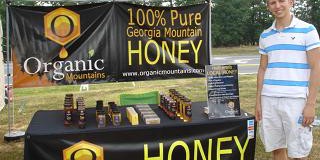Improving Your Wellness with Food –
How to Buy Organic, Seasonal, Local
There’s a lot of buzz around the concept of healing with food. After all, our grandparents didn’t have huge grocery stores to shop in, and they always seemed to create nutritious meals from their gardens, the butcher shop, and the bakery. They also seemed to have less chronic illnesses, flu, and colds – stronger immune systems – because their food seemed to be filled with vitamins, minerals, pre- and probiotics, and enzymes. So, how can we get back to eating the best quality food we can find to support our bodies having strong immune systems? We can buy organic, seasonal, local food.
What Does Buy Organic, Seasonal, Local Mean?
Let’s use a common sense approach to define organic, seasonal, local. When we were kids, our families were cash poor but we didn’t know it. Every single one of the neighbors on our block had some sort of family garden. We didn’t have a Loew’s or Home Depot to go to for fertilizer, bug sprays, etc., and even if we did, our folks wouldn’t have had the money to pay for them. So, we used what we composted — our veggie peals, grass clippings, leaves, and fish bones. We mulched with hand-shredded newspaper, did companion planting, used dish soap to make a bug spray, and pulled caterpillars from our tomatoes and squash by hand. These techniques are all common practices for organic gardeners.
Since we lived in Chicago, where the hot growing season is relatively short, we all knew what to plant when. We sprouted peas, greens, and lettuces at the end of February, for planting in cold frames in early March. We didn’t plant our summer crops like tomatoes, egg plant, and summer squash until the soil warmed up. We planted pumpkins and winter squash after the soil warmed but early enough for their long gestation. When the summer crops were harvested, we put in broccoli, cauliflower, and sprouts — which we harvested until Thanksgiving. We ate what we could harvest, so seasonal vegetables and fruits were a natural part of this way of life.
We also traded produce for milk, meat, and eggs with the local farmer and each other. The elderly couple who lived next door didn’t garden but her husband hunted. He traded venison and other game for fresh veggies. Another example is that a neighbor lady grew vegetables and fruits which she used in making her family’s traditional Italian recipes. We traded our crucifers, which she did not grow, for garlic, oregano and other Italian herbs. By trading local, seasonally appropriate foods, we kept everyone in the community fed with nutrition-rich food and also experienced food from other cultures.
These three stories perfectly illustrate the concepts of buying organic (chemical and pesticide free), seasonal (eat veggies and fruits when they are in a natural cycle of harvesting), and local (eat what grows where you live). The nutritional benefits for your family will be great, and you will support the growth of your local economy.
Where Do I Buy Organic, Seasonal, Local Food?
Last Saturday we went to the Decatur Farmer’s Market which is open year round on Wednesdays and Saturdays. Local farmers, cheese makers, artisan bakers, and herbalists participated in the market. We bought some herbal teas from the founder of the market, Duane Marcus, and they were tasty and effective. I’ve been drinking the tea Duane recommended for my digestion for over a week now, and it’s very soothing.
We also connected with the couple who run the farm in Douglasville. It’s about a mile or so from our house. We were thrilled to know that someone as committed to organic, local, seasonal food as we are had a nearby farm. We bought some lovely bok choy from them and stir fried it with oyster mushrooms and organic chicken. The bok choy was superb and very tender!
We also bought salsas and mole from Zocalo Salsas who had a booth at the farmer’s market. We heated up leftover organic chicken in the mole sauce, and it was a true gourmet experience. We also loved tasting the various salsas that Luis Martinez Obregon creates.
So, visiting farmer’s markets is a good way to find the local growers and sample their products. You can also research finding local organic farmers at http://www.localharvest.org/.
John Wright Supports Local Farmer’s Markets
Beginning in the spring, John Wright, owner of Bee Wild, will return to two local farmer’s markets: Farmers Atlanta Road Market in Smyrna, GA and the Green Market at Peachtree Center. John brings a full selection of our honey products to these markets, which begin in April, 2013. He also is promising a surprise product for our local customers.
Whether you go to a farmer’s market or straight to a local farm, know that you can improve your family’s health by buying organic, seasonal, local food.
QueenBee








